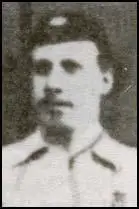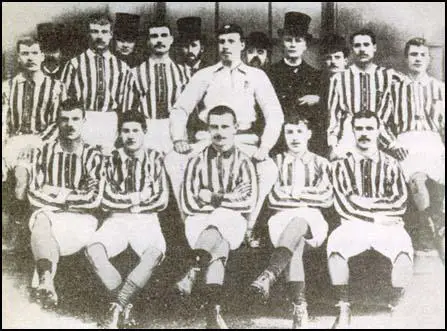Bob Roberts

Bob Roberts was born in West Bromwich on 3rd April 1859. The West Bromwich Strollers club was formed in 1879 by a group of young men from the Salter's Spring Factory. Initially they played cricket at Dartmouth Park but in 1882 they decided to form the West Bromwich Albion football club. Roberts, who worked at the factory, played his first game for WBA on 29th January, 1881.
Roberts played in virtually every outfield position before eventually becoming the team goalkeeper. In his book, The Essential History of West Bromwich Albion, Gavin McOwan argues: "The 6ft 4in tall, 13-stone Roberts became known as the Prince of Goalkeepers... His hefty physique (he wore size 13 boots) was a huge asset in the days when forwards would try to steamroller keepers through the goal - with or without the ball."
WBA entered the FA Cup in the 1883-84 season but lost in the first round to Wednesbury Town. The following year they played Aston Villa away in the 3rd round. Over 22,000 people saw WBA beat their local rivals 3-0. After beating Druids they faced the mighty Blackburn Rovers in the 5th round. A record home attendance of 16,393 saw Blackburn win 2-0.
In the 1885-86 season WBA beat Wolverhampton Wanderers (3-1), Old Carthusians (1-0), Old Westminsters (6-0) and Small Heath Alliance (4-0) to reach the final of the competition. Their opponents were Blackburn Rovers, who were appearing in their third successive final. Four of the players, Fergie Suter, Hugh McIntyre, Jimmy Brown and Jimmy Douglas were playing in their fourth final in five season. The game at the Kennington Oval ended in a 0-0 draw.
The replay took place at the Racecourse Ground, Derby. A goal by Joe Sowerbutts gave Blackburn Rovers an early lead. In the second-half James Brown collected the ball in his own area, took the ball past several WBA players, ran the length of the field and scored one of the best goals scored in a FA Cup final. Blackburn now joined the Wanderers in achieving three successive cup final victories.
This was a magnificent achievement for a team of amateurs. Seven members of the team that reached the 1886 FA Cup Final still worked at Salter's Spring Factory. This included Bob Roberts, Charlie Perry, George Woodhall, George Timmins, Ezra Horton George Bell, and Harry Bell. All eleven players were born within a six-mile radius of West Bromwich. At the time the town had a population of 56,000 people.
Roberts was WBA's star player in these early years. A local newspaper commented: "There is no player who has done more to make the Albion the club what it is than Bob Roberts. It is not only his cleverness between the uprights, but the coolness and direction of others."
In the 1886-87 season WBA beat Burton Wanderers (6-0), Derby Junction (2-1), Mitchell's St George (1-0), Lockwood Brothers (2-1), Notts County (4-1), Preston North End (3-1) to reach the final against Aston Villa. For the second successive year WBA lost the final 2-0.
In March, 1887, Bob Roberts won his first international cap playing for England against Scotland. Also in the team that day was Joseph Lofthouse, James Forrest and Fred Dewhurst. England won the match 3-2. Roberts also played in two other international games. He was a member of the England team that beat Ireland 5-1 and 9-1.
WBA was in great form in the 1887-88 season, scoring 195 goals in 58 first-team matches. The club also enjoyed another good run in the FA Cup beating Stoke City (4-1), Old Carthusians (4-2) and Derby Junction (3-0) to reach the final against Preston North End.
A crowd of nearly 20,000 watched the final at the Kennington Oval on 24th March, 1888. The 19-year-old Billy Bassett was the star of the game and after one long dribble he passed to Jem Bayliss who scored the opening goal. Fred Dewhurst scored an equalizer early in the second-half but WBA gradually got the upper-hand. According to Philip Gibbons in Association Football in Victorian England: "Bassett tormented their defence". He eventually provided the cross for George Woodhall to score the winning-goal ten minutes from time. Roberts had at last won a cup-winners' medal.

Albert Aldridge, Charlie Perry, Ezra Horton, Bob Roberts, George Timmins, Harry Green;
front row, George Woodhall, Billy Bassett, Jem Bayliss, Tom Pearson, Joe Wilson.
On 2nd March, 1888, William McGregorcirculated a letter to Aston Villa, Blackburn Rovers, Bolton Wanderers, Preston North End, and West Bromwich Albion suggesting that "ten or twelve of the most prominent clubs in England combine to arrange home and away fixtures each season." John J. Bentley of Bolton Wanderers and Tom Mitchell of Blackburn Rovers responded very positively to the suggestion. They suggested that other clubs should be invited to the meeting being held on 23rd March, 1888.
The following month the Football League was formed. It consisted of six clubs from Lancashire (Preston North End, Accrington, Blackburn Rovers, Burnley, Bolton Wanderers and Everton) and six from the Midlands (Aston Villa, Derby County, Notts County, Stoke, West Bromwich Albion and Wolverhampton Wanderers).
The first season of the Football League began in September, 1888. WBA's professional players received 10 shillings a week, with no bonuses or expenses. Preston North End won the first championship without losing a single match and acquired the name the "invincibles". West Bromwich Albion finished in 6th place with Billy Bassett ending up as the club's top scorer with 14 goals in 25 games. Second in the list was Tom Pearson who scored 12 in 26.
Preston North End also won the First Division title in the 1889-90 season. WBA finished in 5th place. Top scorer for the club that season was Tom Pearson with 17 goals in 24 games.
Roberts left WBA in 1889. However, he returned in 1891 where he played in nine more games before leaving in 1892 for Aston Villa. However, he retired from professional football later that year.
Bob Roberts died in 1933.
